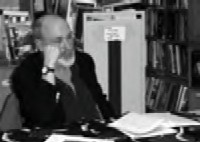From everyone at The Somerville News, we want to wish our readers and advertisers a Happy New Year with best wishes for 2009! |
|||
(The (August 2008) A I can't believe we were First of all, where A lot of us guys wore those beige suede bucks Some of us got taps put on The hairstyles have really changed as well! Miss Charlton I There were a few real knockouts The There were still a few Lots of double-breasted blue blazers with brass I It's hard to imagine that it was forty years ago. I Styles changed over the next I can't believe how many of my 1968 Styles may have changed, but true |
|||
| School Committee rejected first measure to explore changes
By George P. Hassett (June 2008) What In his inaugural But the first move by an elected official to The Ward 2 member Theresa Cardoso said, "Where is the However, Curtatone said that strong "That Pieces of the city charter are outdated, he said, yet he One thing Curtatone said he would not support in a charter reform is any lessening of his power as mayor. "I Curtatone said his motivation for "We had to send home rule The task force will analyze the The issue of charter change was last raised White "I have not had anyone contact me about it," he said. |
|
(The (November 2008) To the Charter Review Committee, I I respectfully suggest that you might have There For as long as anyone can remember, our mayors This parallels and is fed by the enormously increased The resulting autocracy expresses From 1975 to 1985, the Board of The Over the past century, the response When I asked what your research on I would suggest that • • over the decades, our own strong-mayor government has become unaccountable to the voters; • you should actually examine objective conditions before you pronounce Somerville government to be working well; • Lowell and Lawrence had very similar economies And Somerville citizens now have no I do applaud your recommendation to finally grant The notion that a person of color Taken together, the recommendations you have made When our nation's founders There are many among Somerville's citizens who Do |
|||
By George P. Hassett (August 2008) A In fiscal year 2006, when the ordinance Still, Curtatone said an The original proposal would have The As the real estate In The 2006 proposal was branded as "de Gewirtz The |
||||
By Editorial Staff (August 2008) Middlesex Buonomo, 56, of Newton, was put in handcuffs Wednesday Prosecutors "It The Based on this and During the weeks of the investigation, Buonomo was According to the The breaking and entering and theft of public property charges are felonies. The larceny under $250 is a misdemeanor charge. Buonomo |
|||
|
|||||||||||||||||||
|
No matter where you go Somerville is not far behind. I found on my recent literary related trip to New York City all kinds of Somerville connections. I had planned to visit my mother in New York the first weekend in February, and it just so happened that poet Charles Ries from Wisconsin was reading at the KGB bar in the Bowery and he invited me and other folks to attend. Charles was attending the Association of Writer's and Writing Programs conference in NYC. It was held on 52nd St. at the Sheraton so I figured I would make a pit stop there. Unfortunately you have to register to get in, and they were booked, so I was unable to attend the book fair segment. You figure they would let the general public in for the book tables. As a publisher and poet I would want as many folks as possible to be exposed to my books, not just our arcane world of small press people. But being the small press guerilla that I am to the bone, I left "Ibbetson Street" magazines strategically appointed around the lobby. Hopefully they got a receptive audience… a literary minded bellboy, or perhaps a luminary like Sue Miller picked it up in an afterthought. Interesting enough earlier that day I received an email from a British poet Eva Salzman, who was a good friend of the late Poet Sarah Hannah, an acquaintance of mine who committed suicide last spring. She wrote me that she saw the interview I conducted on "Somerville Community Access TV" with Hannah, and was going to excerpt it in the current issue of "Dark Horse" a well-regarded literary magazine in Scotland. She told me she wrote an essay about Hannah. After this, inspired by Kazan's "A Walker In The City" I walked in the rain from 52nd Street to 4th Street in the Bowery. I was surprised what this 52-year-old body can do when inspired. The city is a source of constant fascination: the ancient tenements amidst the eruption of post-modern edifices, the unexpected arcane little shops, the dark mystery of gone-to seed Irish pubs, the protrusion of plantains from street side Bodegas, and the cacophony of Salsa, and car horns. Charles Simic our new poet/laureate wrote that while walking the city streets many years ago he tried to help find a pearl lost in the gutter for a tearful woman. He never found it but still looks for it after all these years. Needless to say a poem was birthed from this. There were no pearls before this swine however on this trip. Anyway when I hit the Bowery for some reason Sarah Hannah's name came up in my head. During my walk I came across the Bowery Poetry Club. So like a dog (one with a Somerville-pedigree, mind you) on a meat truck I rushed in. I ran into Jim Kates the founder of the Zephyr Press (founded in Somerville) and he introduced me to a young poet from Somerville. We chatted and I gave her a copy of Ibbetson Street that had an interview with Hannah. It turns out she was a student of Hannah's at Emerson College, and loved her as a teacher and person, as many did. Later I spoke to a young man from the famed avant-garde small press "New Directions" founded by the late James Laughlin. One of our first books "The Life of All Worlds" by Marc Widershien had a blurb from Laughlin. The KGB bar was a down-at-the heels, hole-in-the wall, and a perfect spot for a reading. It really did have a lot of boheme charm. In the two hours I was there I got to talk to Charles Ries, I met the publisher of the "Mad Hatter's Review," a freshly-minted MFA student from the south coast of Florida, Michael Ditusa, and a professor of Literature from Miami University in Ohio. What a crowd, a lot of hip young poets. And although I am married I am not blind, and some were not only talented but quite striking in other ways as well. The next day I had the chance to meet my brother Donald Holder and my mother for dinner. Don is a Broadway lighting designer and he told me he is going to be working on a revival of "South Pacific" by James Michener. Just the other day I interviewed on Somerville Community Access TV Errol Uys, the author of "Brazil" who worked extensively with Michener. Hopefully the two will talk soon. On the Greyhound back to Boston I ran into my neighbors Tam Lin Neville and Bert Stern. Tam and Bert are Somerville poets and publishers ("Off the Grid Press"), and we talked shop and talked Somerville. One from this talented couple will be reading at the Somerville News Writers Festival. So from start to end Somerville was present on my trip. Just goes to show what a great literary community we live in, and it has legs, man! |
|||||||||||||||||||
Local man lied to many, including a newspaper By George P. Hassett On And he was successful. Two days In an interview that lasted more than 90 As a lawyer for However, News staffers When he came into the When a reporter interviewed him for this story the question that kept popping up was, "why?" "I don't know why I did it. I keep coming up with question marks when I think about it," Craven said. The "I got a good sense of the team and how they played together," he said. Craven "I just wanted to scout and work for the team so bad I think I started to believe I did," he said. One And the lies didn't "He talked As bizarre as it was, Craven But The woman then called the police who, she said, From that moment, As |
|||
(The (May 2008) This Just This last winter was really bad. By evening, I'd feel so Then, just Californians But for the most part, Californians Somervillians are more Personally, I would prefer to live among people who One of the reasons that we find the differences in our As In But strength, trust, and endurance in relationships don't When the web of There are other California has rarely experienced the Yet for all of the dissatisfactions that I might As I just wrote that, I So, much to the dismay and disgust of many of you, dear readers, I'm staying here. |
|||||























Reader Comments